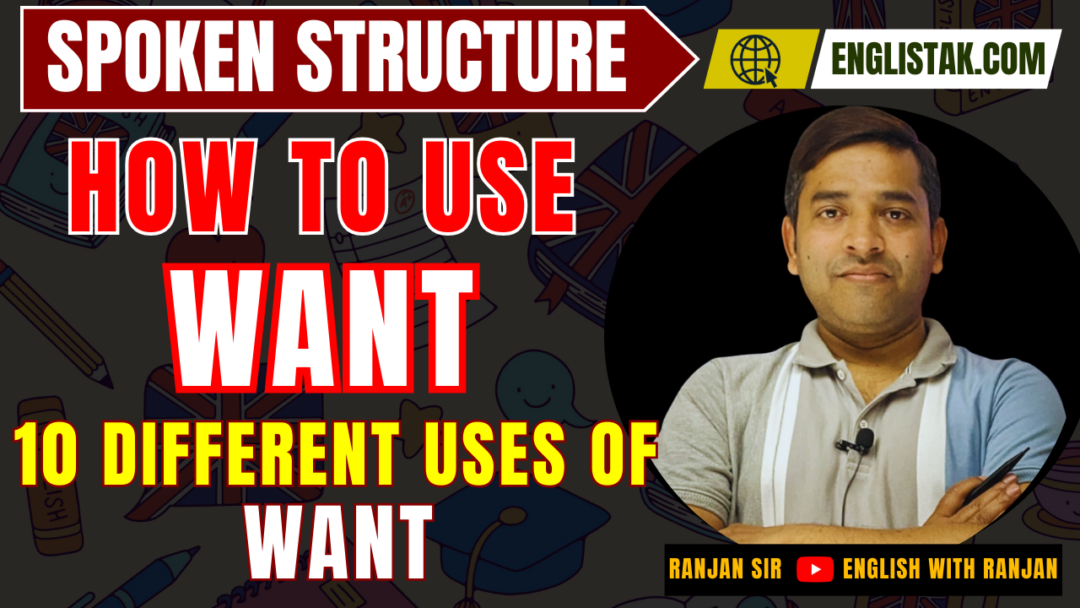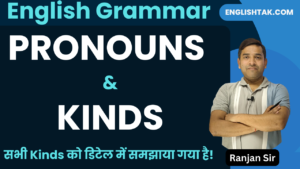![]()
Spoken English Structure with WANT
Spoken English Structure with WANT – Welcome to our quick guide on using the verb want in various sentence patterns! In this post, we explore how to structure sentences with want—from basic declarations to interrogative forms—complete with examples in English and their Hindi translations. Whether you’re a language learner or a teacher looking for creative ways to explain grammar, this post offers a concise yet comprehensive overview to help you express desires and requests accurately in English. Enjoy diving into these patterns and start practicing today!
Top Spoken English Structure with WANT
Table of Contents
Subject Verb Agreement
| Subject | Verb |
| I | want / do |
| We | want / do |
| You | want / do |
| He | wants / do |
| She | wants / does |
| It | wants / does |
| They | want / does |
| Name | wants / does |
| Singular Subject | wants / does |
| Plural Subject | want / do |
1. Basic Pattern: Subject + want(s) + Noun Phrase (Object)
Pattern:
Subject + want / Want+ [noun phrase]
- I want a new book.
मुझे एक नई किताब चाहिए। - She wants a delicious cake.
उसे एक स्वादिष्ट केक चाहिए। - They want a comfortable house.
उन्हें एक आरामदायक घर चाहिए। - We want some fresh fruits.
हमें कुछ ताजे फल चाहिए। - He wants a cool bicycle.
उसे एक शानदार साइकिल चाहिए। - You want a stylish jacket.
तुम्हें एक स्टाइलिश जैकेट चाहिए। - The children want a fun toy.
बच्चों को एक मजेदार खिलौना चाहिए। - My friend wants a powerful computer.
मेरे दोस्त को एक शक्तिशाली कंप्यूटर चाहिए। - Our teacher wants a quiet classroom.
हमारे शिक्षक को एक शांत कक्षा चाहिए। - The cat wants a soft bed.
बिल्ली को एक नरम बिस्तर चाहिए।
2. Infinitive Pattern: Subject + want(s) + to-infinitive
Pattern:
Subject + want / wants + to + V1 + Obj
- I want to eat ice cream.
मुझे आइस क्रीम खाना है। - She wants to watch a movie.
वह एक फिल्म देखना चाहती है। - They want to travel to India.
वे भारत की यात्रा करना चाहते हैं। - We want to learn French.
हम फ्रेंच सीखना चाहते हैं। - He wants to play football.
वह फुटबॉल खेलना चाहता है। - You want to read a mystery novel.
तुम एक रहस्यमय उपन्यास पढ़ना चाहते हो। - The students want to explore science.
छात्रों को विज्ञान का पता लगाना है। - My brother wants to fix his bike.
मेरे भाई को अपनी साइकिल ठीक करनी है। - Our team wants to win the championship.
हमारी टीम चैंपियनशिप जीतना चाहती है। - The baby wants to crawl.
बच्चा रेंगना चाहता है।
Spoken English Structure with WANT
3. Causative/Request Pattern: Subject + want(s) + Someone + to-infinitive
Pattern:
Subject + want / wants + [someone] + to + V1 + Obj
- I want you to help me.
मैं चाहता हूँ कि तुम मेरी मदद करो। - She wants her friend to call her.
वह चाहती है कि उसकी दोस्त उसे कॉल करे। - They want their parents to approve their plan.
वे चाहते हैं कि उनके माता-पिता उनकी योजना को मंजूरी दें। - We want the manager to resolve the issue.
हम चाहते हैं कि प्रबंधक समस्या को हल करे। - He wants his brother to join him.
वह चाहता है कि उसका भाई उसके साथ जुड़ जाए। - You want your teacher to explain the lesson.
तुम चाहते हो कि तुम्हारा शिक्षक पाठ समझाए। - The coach wants the players to practice harder.
कोच चाहता है कि खिलाड़ी कड़ी मेहनत करें। - My sister wants her neighbour to lend her a book.
मेरी बहन चाहती है कि पड़ोसी उसे एक किताब उधार दे। - Our leader wants everyone to contribute.
हमारे नेता चाहते हैं कि सभी योगदान दें। - The director wants the actor to perform better.
निर्देशक चाहता है कि अभिनेता बेहतर प्रदर्शन करें।
Spoken English Structure with WANT
4. Negative Forms
4A. Negative with Noun Phrase
Pattern:
Subject + do/does not + want + [noun phrase]
- I do not want a salad.
मुझे सलाद नहीं चाहिए। - She doesn’t want a new dress.
उसे नई पोशाक नहीं चाहिए। - They do not want extra homework.
उन्हें अतिरिक्त होमवर्क नहीं चाहिए। - We don’t want any trouble.
हमें कोई मुसीबत नहीं चाहिए। - He does not want a noisy room.
उसे शोरगुल वाला कमरा नहीं चाहिए। - You don’t want a boring lecture.
तुम्हें उबाऊ व्याख्यान नहीं चाहिए। - The children don’t want a bedtime story.
बच्चों को सोने की कहानी नहीं चाहिए। - My friend doesn’t want a cold drink.
मेरे दोस्त को ठंडा पेय नहीं चाहिए। - Our teacher does not want a messy classroom.
हमारे शिक्षक को गंदा कक्षा नहीं चाहिए। - The cat doesn’t want a wet towel.
बिल्ली को गीला तौलिया नहीं चाहिए।
4B. Negative with to-infinitive
Pattern:
Subject + do/does not + want + to + V1 + Obj
- I do not want to leave now.
मुझे अभी जाना नहीं है। - She doesn’t want to speak in public.
वह सार्वजनिक रूप से बोलना नहीं चाहती। - They do not want to participate.
वे भाग लेना नहीं चाहते। - We don’t want to argue.
हमें तकरार नहीं करनी है। - He does not want to run in the rain.
उसे बारिश में दौड़ना नहीं है। - You don’t want to miss the train.
तुम ट्रेन चूकना नहीं चाहते। - The students don’t want to study tonight.
छात्रों को आज रात पढ़ाई नहीं करनी है। - My brother doesn’t want to wake up early.
मेरे भाई को जल्दी जागना पसंद नहीं है। - Our team doesn’t want to lose the game.
हमारी टीम खेल हारना नहीं चाहती। - The baby doesn’t want to sleep.
बच्चा सोना नहीं चाहता।
4C. Negative with Someone + to-infinitive
Pattern:
Subject + do/does not + want + [someone] + to + V1 + Obj
- I don’t want you to worry.
मैं नहीं चाहता कि तुम चिंता करो। - She doesn’t want him to be sad.
वह नहीं चाहती कि वह उदास हो। - They don’t want their friends to leave early.
वे नहीं चाहते कि उनके दोस्त जल्दी चले जाएँ। - We don’t want our neighbours to complain.
हम नहीं चाहते कि हमारे पड़ोसी शिकायत करें। - He doesn’t want his mother to be upset.
वह नहीं चाहता कि उसकी माँ परेशान हों। - You don’t want your brother to miss the bus.
तुम नहीं चाहते कि तुम्हारा भाई बस चूक जाए। - The teacher doesn’t want the students to be late.
शिक्षक नहीं चाहते कि छात्र देर से आएँ। - My parents don’t want me to stay out late.
मेरे माता-पिता नहीं चाहते कि मैं देर तक बाहर रहूँ। - Our boss doesn’t want employees to be unproductive.
हमारे बॉस नहीं चाहते कि कर्मचारी गैर-उत्पादक हों। - The coach doesn’t want the players to quit.
कोच नहीं चाहता कि खिलाड़ी छोड़ दें।
5. Interrogative Forms
5A. Yes/No Questions with Noun Phrase or to-infinitive
Pattern:
Do/Does + subject + want + [noun phrase/to + V1 + Obj]?
- Do you want a coffee?
क्या तुम्हें कॉफी चाहिए? - Does she want a new phone?
क्या उसे नया फोन चाहिए? - Do they want to join us?
क्या वे हमारे साथ जुड़ना चाहते हैं? - Does he want some help?
क्या उसे कुछ मदद चाहिए? - Do we want more time?
क्या हमें और समय चाहिए? - Does the dog want to play?
क्या कुत्ते को खेलना है? - Do you want to try this dish?
क्या तुम यह व्यंजन आज़माना चाहते हो? - Does she want to visit the museum?
क्या उसे संग्रहालय जाना है? - Do they want a chance to win?
क्या वे जीतने का मौका चाहते हैं? - Does he want to join the meeting?
क्या उसे बैठक में शामिल होना है?
5B. Wh.-Questions
Pattern:
Wh-Question word + do/does + subject + want + [noun phrase/to + V1 + Obj]?
- What do you want?
तुम क्या चाहते हो? - Which colour do you want?
तुम कौन सा रंग चाहते हो? - Where does she want to go?
वह कहाँ जाना चाहती है? - When do they want to arrive?
वे कब आना चाहते हैं? - Why does he want to leave?
वह क्यों जाना चाहता है? - Who do we want to invite?
हम किसे आमंत्रित करना चाहते हैं? - What does she want to eat?
वह क्या खाना चाहती है? - How do you want to travel?
तुम कैसे यात्रा करना चाहते हो? - Which movie does he want to watch?
वह कौन सी फिल्म देखना चाहता है? - What do they want to achieve?
वे क्या हासिल करना चाहते हैं?
Spoken English Structure with WANT
6. Additional Forms and Emphatic/Modal Variations
These examples add emphasis or modal expressions along with want.
- I really want to finish this project.
मैं वास्तव में इस परियोजना को समाप्त करना चाहता हूँ। - She absolutely wants a break.
उसे बिल्कुल एक ब्रेक चाहिए। - They genuinely want to help us.
वे सचमुच हमारी मदद करना चाहते हैं। - We truly want to make a difference.
हम सचमुच बदलाव लाना चाहते हैं। - He definitely wants to win the competition.
वह निश्चित रूप से प्रतियोगिता जीतना चाहता है। - You clearly want to succeed in life.
तुम्हें स्पष्ट रूप से जीवन में सफलता चाहिए। - The team really wants to overcome the challenge.
टीम वास्तव में चुनौती को पार करना चाहती है। - My friend truly wants to join our club.
मेरे दोस्त को सचमुच हमारे क्लब में शामिल होना है। - Our leader definitely wants to improve the community.
हमारे नेता निश्चित रूप से समुदाय में सुधार करना चाहते हैं। - The children really want to have fun at the park.
बच्चों को वास्तव में पार्क में मज़ा करना है।
Spoken English Course in Hindi
Tips to learn Vocabulary for Hindi Medium Students
Master Telephone Conversations from Hindi to English
100 Most Common Daily Use English Sentences
Tips to Learn English for Hindi Medium Learners
English Conversation Practice Customer Service Pdf
110 Most Common Interview Questions You Must Prepare in 2025
Present Indefinite Tense Questions Answer
Words with Silent Letters in English A to Z






